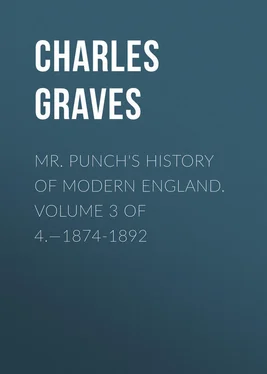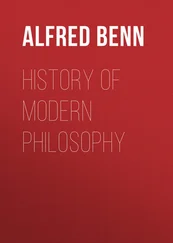Charles Graves - Mr. Punch's History of Modern England. Volume 3 of 4.—1874-1892
Здесь есть возможность читать онлайн «Charles Graves - Mr. Punch's History of Modern England. Volume 3 of 4.—1874-1892» — ознакомительный отрывок электронной книги совершенно бесплатно, а после прочтения отрывка купить полную версию. В некоторых случаях можно слушать аудио, скачать через торрент в формате fb2 и присутствует краткое содержание. ISBN: , Издательство: Иностранный паблик, Жанр: foreign_prose, foreign_humor, на английском языке. Описание произведения, (предисловие) а так же отзывы посетителей доступны на портале библиотеки ЛибКат.
- Название:Mr. Punch's History of Modern England. Volume 3 of 4.—1874-1892
- Автор:
- Издательство:Иностранный паблик
- Жанр:
- Год:неизвестен
- ISBN:http://www.gutenberg.org/ebooks/47300
- Рейтинг книги:3 / 5. Голосов: 1
-
Избранное:Добавить в избранное
- Отзывы:
-
Ваша оценка:
- 60
- 1
- 2
- 3
- 4
- 5
Mr. Punch's History of Modern England. Volume 3 of 4.—1874-1892: краткое содержание, описание и аннотация
Предлагаем к чтению аннотацию, описание, краткое содержание или предисловие (зависит от того, что написал сам автор книги «Mr. Punch's History of Modern England. Volume 3 of 4.—1874-1892»). Если вы не нашли необходимую информацию о книге — напишите в комментариях, мы постараемся отыскать её.
Mr. Punch's History of Modern England. Volume 3 of 4.—1874-1892 — читать онлайн ознакомительный отрывок
Ниже представлен текст книги, разбитый по страницам. Система сохранения места последней прочитанной страницы, позволяет с удобством читать онлайн бесплатно книгу «Mr. Punch's History of Modern England. Volume 3 of 4.—1874-1892», без необходимости каждый раз заново искать на чём Вы остановились. Поставьте закладку, и сможете в любой момент перейти на страницу, на которой закончили чтение.
Интервал:
Закладка:
Let Punch speak his mind in this matter. Political partisanship and party spirit are both at low, as well as lukewarm, water in England just now; but, if anything will fire John Bull's blood to fever heat, it is such horrors as have been perpetrated in Bulgaria – and part of his wrath will assuredly be visited on those who have striven to interpose official blinds or buffers between England and the sight or shock of these horrors… The head of Her Majesty's Opposition asserted for the Newspaper Correspondents the credit which English common sense and experience unite to claim for them.
Contemporary records – including the files of Punch – do not bear out the statement about the lukewarmness of party spirit. The country was acutely divided, and dissatisfaction with Sir H. Elliot, our Ambassador at Constantinople, prompted Punch's retort, when Lord Beaconsfield declared that the Bulgarian atrocities were "beyond recall," "Yes, but your Ambassador isn't." Gladstone is rebuked for hiding in his tent; but he made amends by launching his famous, though sadly premature, phrase about clearing the Turk out of Europe, "bag and baggage."
Neutrality under Difficulties
Serbia's resistance was soon overcome, but the Powers forced Turkey to grant her an armistice, and largely through Great Britain's influence, a Conference was held at Constantinople where Lord Salisbury was our representative. A short breathing-space was thus gained, but the Conference was abortive, and war between Russia and Turkey broke out in 1877. Punch was in rather a delicate position: for while distinctly anti-Turk, he had never trusted Russia. Thus, while assailing the Daily Telegraph , Pall Mall Gazette and Morning Post for their Chauvinism, and the Tory press generally for their campaign against Russia and their support of the "veracious Turk," he was hardly less severe in his strictures on the belligerent humanitarians who would have welcomed pro-Russian intervention. Punch advocated neutrality, but he was fully alive to the difficulties of the situation, and expressed them in a cartoon in which the British Lion is exhibited in a bothered mood, distrustful of Russia, and unable to make out what the Government meant, or the Opposition either. In his comments on the debate on Mr. Gladstone's resolution, Punch deplores the weakness and dissensions of the Opposition and supports the bolder spirits. Many years were to elapse before Lord Salisbury made his remarkable speech about our having "backed the wrong horse," i.e. Turkey, in the Crimean War. That speech proved that Punch was fully justified in seizing on the caution which the same speaker had given nearly twenty years earlier. For Lord Salisbury declared in 1897 that the defence of the diplomacy of 1878 lay in its traditional character, not in its inherent excellence, and that neither he nor Lord Beaconsfield was free from misgivings as to its results. The music halls have not often enriched the language with permanent additions, but they added "Jingo" and "Jingoism" in 1877. Punch's comment on Macdermott's famous song is instructive. It was inspired by a reference in the Paris Figaro : —
On the back page of the Figaro is given one verse in English, with the music, of that "War Song" of the Music Halls, which just now enjoys its share of popularity with " Nancy Lee ," and " Jeremiah, Blow the Fire ," and a translation of the whole song into French, of which the Figaro says apologetically, " Des vers français n'auraient pu arriver à la sauvage énergie de l'original ." The chorus of the song, as sung by most of our London street-boys, instead of " They all do it ," and " Woa Emma ," recently shelved, is this: —
"We don't want to fight, but by Jingo if we do," etc. And the translation, which " n'aurait pu arriver à la sauvage énergie de l'original ," is:
" Nous ne voulons pas la guerre, mais, par Dieu! si nous combattons ," etc.
If " par Dieu !" is not to an Englishman's thinking rather more savagely energetic than "By Jingo!" then words are meaningless. If " par Dieu !" is to be accepted as an equivalent, and as, after all, rather a weak equivalent for "by Jingo!" then either the Frenchman has a very low idea of the Englishman's religion, or his " Dieu " means nothing more, ordinarily, than our "Jingo." But "Jingo" is not a savagely energetic exclamation, nor is the true feeling of this country to be gauged by the popularity of a Music-Hall song.
Punch was both right and wrong. The music halls are not a true index of the political sagacity of the country; but he did not foresee that the refrain of this particular song would survive, by virtue of its very blatancy, as a terse summary of national complacency. At the same time he paid homage to its merits by printing a neat Latin rendering from the pen of an Etonian: —
Inviti quamquam saevo confligere bello,
Adsit opus, Jingo testamur Bellipotentem,
Sunt nobis nummi, sunt agmina, tela, carinae.
Indian Troops in Europe
The intervention of amateur diplomatists, clerical or professorial, however well-meant, was firmly and impolitely discouraged when Turkey and Russia were at death grips at Plevna. Early in 1878 Punch endeavoured to turn such efforts into ridicule, as instances of "self-election of the unfittest." Still the naval demonstration in Besika Bay found Punch in his most pacific mood, applauding Lord Carnarvon, who with Lord Derby had resigned, and condemning Lord Beaconsfield's dangerous action and unconvincing explanations. The calling out of the Reserves still further increased Punch's anxiety, and inspired a "Proclamation" calling for self-restraint. When it was announced that Carlyle had joined Bright and the Duke of Westminster in signing a petition against war, Punch noted that the old sage of Chelsea was anything but a lover of peace at any price. But the incident which perturbed him and other critics of the Government more than anything else was the bringing of a contingent of Indian troops to Europe. Punch vigorously supported Gladstone, who held the action of the Government to be not merely provocative but unconstitutional. When the troops were re-shipped to India, he published a sarcastic inscription, to be engraved on a monument on Primrose Hill commemorating an exploit which had cost £750,000. It seems a little sum to us with our profligate habit of thinking in millions, but the frugal taxpayer of the 'seventies, as represented by Punch , thought it a monstrous extravagance. The inscription is too long to quote in its entirety, but we may give the peroration: —
So, having more than fulfilled
The Expectations of those who imported them
And who, after having transferred them to Cyprus,
Found themselves considerably embarrassed
What next to do with them,
They were re-shipped, quietly and unobtrusively,
To the general mystification of Europe
For the Land of their Birth;
Whence,
Though they have merited the Admiration of Some
And the Respect of Many,
And have left behind them
An Election Cry to All,
It is to be hoped that they will never again visit
The Western Dominions of their Imperial Mistress
Who, through the mouth of Punch
Gladly bids them Adieu !
Not Au Revoir .
Heu vatum ignarae mentes! But Punch , who printed this acid jeu d'esprit on August 3, 1878, could hardly be expected to foresee the need of August 4, 1914.
The year 1878 marked the zenith of Lord Beaconsfield's prestige, for it was the year of the Berlin Congress – from which he claimed to have brought back "Peace with Honour" – and of the annexation of Cyprus. Punch , however, was always suspicious of Dizzy's phrases and preferred to symbolize the results of the Congress in a Pas de Deux by Lord Beaconsfield and Lord Salisbury, both Gartered, and in a rhymed dialogue complacently referring to their egg-dance. The Afghan trouble was assuming a menacing aspect, finely typified in Charles Keene's cartoon, "The Shadow on the Hills." Punch applauded vigilance, but distrusted the Government's intentions, deprecated the spirited policy which involved "a vague and boundless adventure of annexation," and showed Lord Beaconsfield leading John Bull by the nose in search of a "scientific frontier" – another Disraelian phrase – and the Ameer of Afghanistan, between the Bear and the Lion, exclaiming, "Save me from my friends."
Читать дальшеИнтервал:
Закладка:
Похожие книги на «Mr. Punch's History of Modern England. Volume 3 of 4.—1874-1892»
Представляем Вашему вниманию похожие книги на «Mr. Punch's History of Modern England. Volume 3 of 4.—1874-1892» списком для выбора. Мы отобрали схожую по названию и смыслу литературу в надежде предоставить читателям больше вариантов отыскать новые, интересные, ещё непрочитанные произведения.
Обсуждение, отзывы о книге «Mr. Punch's History of Modern England. Volume 3 of 4.—1874-1892» и просто собственные мнения читателей. Оставьте ваши комментарии, напишите, что Вы думаете о произведении, его смысле или главных героях. Укажите что конкретно понравилось, а что нет, и почему Вы так считаете.












